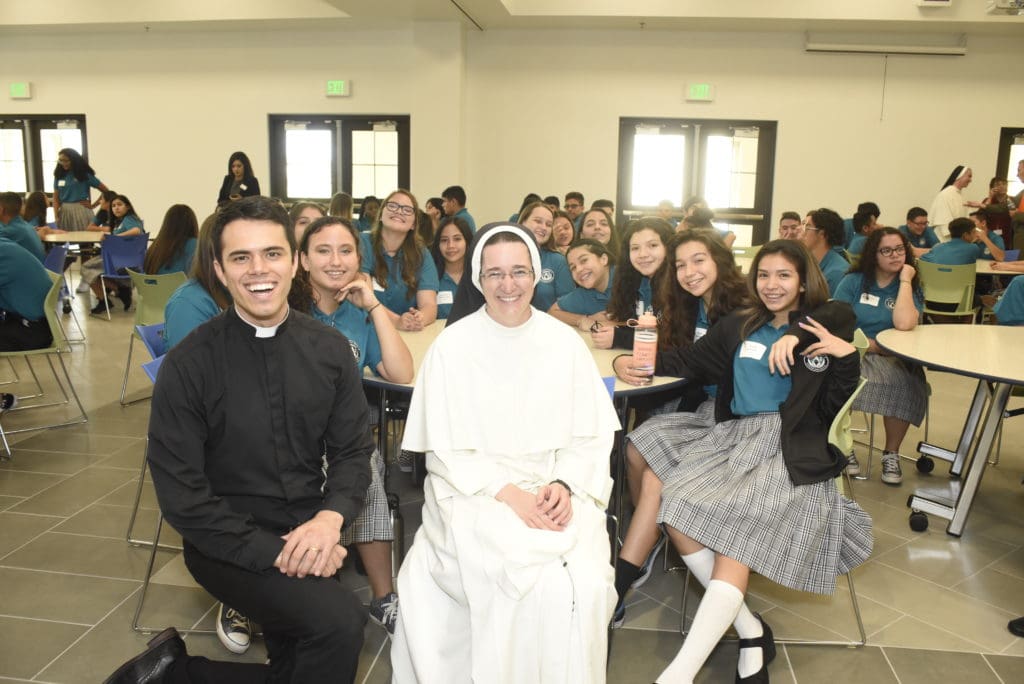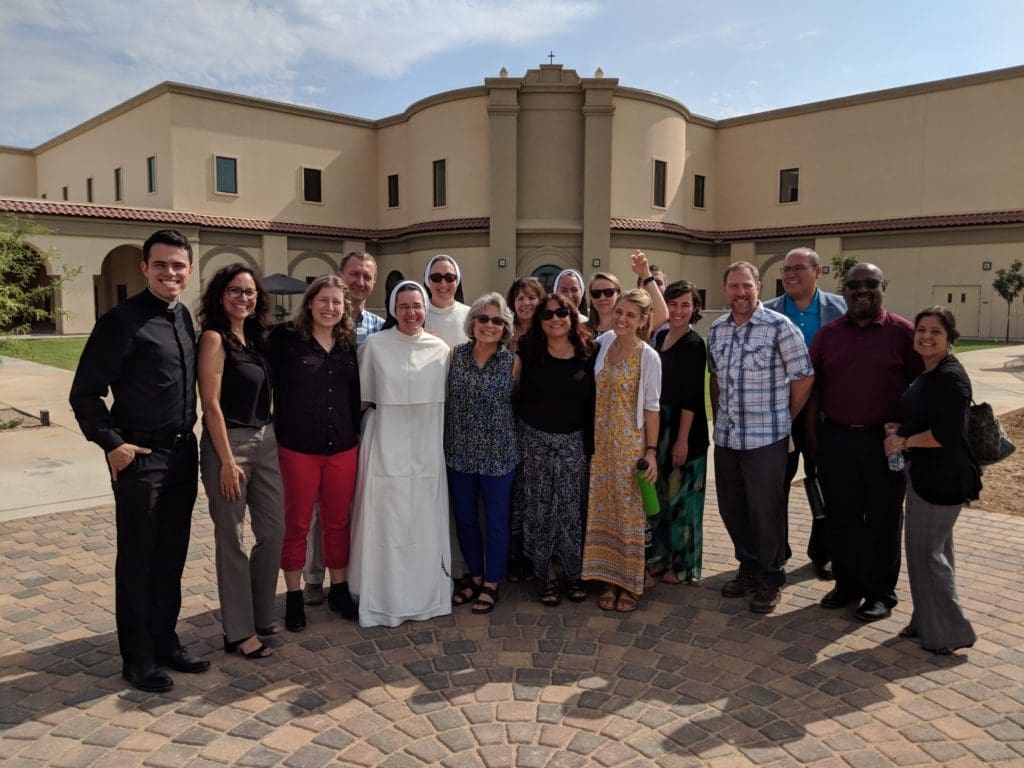Alumni Spotlight: Sr. Regina Ann Tonn, O.P., ’18
Posted on Monday, November 26, 2018

This month’s spotlight travels to Phoenix, Arizona where Sister Regina Ann Tonn, O.P. ’18 teaches at the brand new Saint John Paul II Catholic High School in Avondale, Arizona. After recently earning a B.S. in English from Aquinas College, Sister Regina Ann has now joined an administration and faculty that opened the doors to the first class. According to Sister Mary Jordan Hoover, O.P., principal, the vision for this school outlined by Bishop Olmstead in an apostolic letter (March, 2017) is to evangelize through Catholic education. Phoenix is a missionary diocese which is growing and meeting the demands to spread the Gospel of Jesus Christ to all who live there. Sister Mary Jordan explained, “Building a school culture from scratch requires teachers with generous hearts: those who are mission-driven, generous with their personal gifts, and able to step outside of their comfort zone. Sister Regina Ann has all three of these ingredients.” Sister Regina Ann teaches Religion, English, and Speech to about half the student body, which is currently comprised of the first classes of Freshmen and Sophomores. Additionally, she is working to form students to assist the entire school community in worship during weekly all-school Masses by directing the first Mass schola. Sister Regina Ann shared with Aquinas staff some of her experience starting off as a new teacher with a unique mission.
- Who, and what subjects are you teaching at your school? How many students do you have? Tell us a little about the folks you serve in AZ.
St. John Paul II Catholic High School is a new high school located in the West Valley outside Phoenix, AZ. We have about 150 students total, 38 of whom are sophomores and the rest freshmen. I teach three sections of tenth grade Religion, two sections of ninth grade English, and one section of Speech. Total, I have 78 students – about half of the student body!
Our students are thrilled to be part of a new high school and are highly motivated to learn. I see a desire to grow in their relationship with Christ, and an excitement and openness to establishing new traditions and trying new things. I believe the high degree of motivation comes from an awareness of needing to step up and set the bar high as the first graduating classes of JPII.
- In the West Valley you have met a diverse community drawing from about 20 parishes. According to the Catholic Sun, there has been a 61 percent rise in the West Valley’s Hispanic population since 2000, with a 50 percent increase projected in school-age children by 2050. With more than 70 percent of students identifying as Hispanic, Saint John Paul II High School has made concerted efforts to provide a welcoming environment. Most of the administration speaks Spanish. The school designated a special room for large family meetings. How is it, starting to teach?
Teaching has been an absolute joy! I have loved getting to know my students, their families, their culture, and their language. I told my 10th graders that by the time they memorized the mysteries of the rosary in English I needed to memorize them in Spanish. I did well on my “quiz,” but apparently I need to work on pronunciation!
In many ways, starting to teach has been an experience of learning and growing along with my students. Navigating a brand-new curriculum with students who are new to this higher level of education (without eleventh and twelfth graders in the school to model for them) has certainly been challenging, yet I am learning more everyday just by jumping in, asking questions, and making lots of revisions to my strategies in the classroom.

- What is it like for you as a teacher starting a new school?!
All of the teachers found out early on during in-service that starting a new school requires a high degree of flexibility and detachment. When in-service began in late July, the school building itself was still under construction, so none of us could go in to see the place until about one week before the students arrived. At that point, there was no furniture, no trash cans, and no soap anywhere. Twelve of our classrooms have furniture and other rooms will get furniture in the upcoming years. Right now, due to scheduling difficulties, I am teaching a majority of my classes in an art room! It lacks art supplies, but it does have tables and stools.
“The experience has been very edifying for me,
and I thank God every day for our little ‘lacks.'”
The amazing and somewhat miraculous thing is that these “lacks” have been helping all of us practice the beatitude, Blessed are you poor, and the lessons in detachment are helping all of us realize that Christ is really the one who makes education happen. Students do not buy their own textbooks. They use school-owned books and even share in some cases, and yet they come into class with a big smile and a willingness to learn whatever we can share with them. The experience has been very edifying for me, and I thank God every day for our little “lacks.”
- How did your education at Aquinas College prepare you for this new adventure?
There is no way that any educational institution can prepare a teacher candidate for every possible experience that might come up in the classroom. Therefore, one of the best ways in which Aquinas did prepare me was by teaching me how to reflect. The ability to think back on the lessons of the day, talk about them with others, and make real changes to meet the needs of my students has been a daily necessity for me. I write notes on my lesson plans after my lessons with suggestions about how to change them for either the next day or the next year. I also have frequent conversations with other teachers about everything from classroom management and instructional strategies to how to foster a prayerful atmosphere in my religion classes. Being the “reflective practitioner” has really helped me be open to making mistakes with a confidence that I can discuss them with more experienced teachers and fix them over time.
“As was the case at my graduation,
my mission is still to lead others to Him.”
- What is the most important thing you received at Aquinas?
The most important thing that I received at Aquinas was a Christ-centered education. I learned that our mission as educators is to lead others to truth, knowing that the ultimate truth is the Person of Christ. As was the case at my graduation, my mission is still to lead others to Him.
- Is there anything further you would like to share with our readers?
Just a note of gratitude! I am grateful for my education at Aquinas College and especially to all my teachers for every lesson learned, every piece of feedback given, and every prayer offered. I pray for you at the college everyday still.
Postscript: The State of Arizona is a leader in School Choice initiatives. Arizona tax payers can redirect their state tax liability to Student Tuition Organizations, such as Catholic Education Arizona. Parents are able to apply to the Student Tuition Organizations for scholarships in support of their tuition. Thousands of children from low income families are gaining access to quality Catholic Education because of the tax payers’ decision to re-direct tax dollars. The families usually have to apply for at least four scholarships.
At St. John Paul II Catholic High School both rich and poor students receive a high-quality Catholic education.

